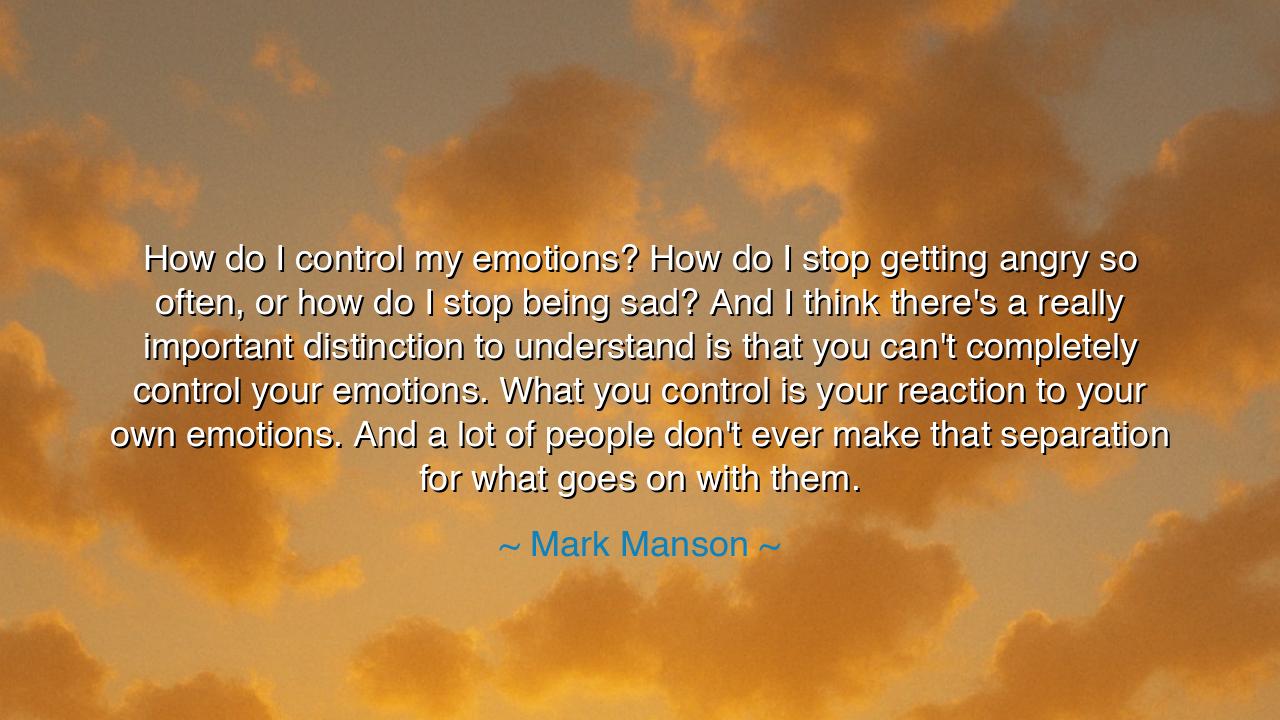
How do I control my emotions? How do I stop getting angry so
How do I control my emotions? How do I stop getting angry so often, or how do I stop being sad? And I think there's a really important distinction to understand is that you can't completely control your emotions. What you control is your reaction to your own emotions. And a lot of people don't ever make that separation for what goes on with them.






The words of Mark Manson, “How do I control my emotions? How do I stop getting angry so often, or how do I stop being sad? And I think there’s a really important distinction to understand — you can’t completely control your emotions. What you control is your reaction to your own emotions. And a lot of people don’t ever make that separation,” are not the musings of a philosopher lost in abstraction, but the voice of a modern sage echoing the timeless truths of human nature. In these words lies the essence of self-mastery, the ancient art not of suppressing what is human, but of governing how one responds to it. Manson’s teaching reaches back through the centuries to the wisdom of the Stoics, the Buddhists, and the mystics who all understood: emotion is the wind, but reaction is the sail.
The ancients knew that to feel deeply is not a flaw — it is the sign of being alive. The Stoic philosopher Epictetus once said, “It’s not what happens to you, but how you react to it that matters.” This mirrors Manson’s insight. The storms of emotion — anger, sadness, jealousy, fear — are forces of nature within the soul. You cannot command the sea to still itself, nor can you order the heart to remain unmoved. But you can learn how to steer through the waves. Wisdom begins not when one silences emotion, but when one learns to observe it without being ruled by it.
Consider the story of Marcus Aurelius, emperor of Rome, burdened with wars, betrayal, and the weight of empire. In his journals, he confessed to moments of rage and despair, yet his greatness lay not in never feeling them, but in his discipline to rise above them. He would pause, reflect, and remind himself that anger harms the one who bears it more than the one who provokes it. In his restraint, he found freedom. Like Manson’s teaching, his life shows that emotional control is not denial — it is awareness coupled with choice.
The modern world often confuses control with suppression. People believe they must hide or erase their emotions to appear strong. But the ancients taught that to repress feeling is to invite its corruption. Anger buried becomes bitterness; sadness denied turns to numbness. Manson’s distinction — between the emotion itself and our response to it — restores balance to this misunderstanding. It reminds us that emotion is neither enemy nor master, but messenger. To feel anger is natural; to act with cruelty because of anger is a choice. To feel sadness is human; to surrender to despair is optional.
There is also tenderness in his teaching. To admit that emotions cannot be fully controlled is to embrace humility — the understanding that the human heart is vast and mysterious. Life will stir passions we cannot predict: grief when we lose, jealousy when we compare, joy when we least expect it. The wise do not condemn these tides; they watch them, learn from them, and let them pass. Just as a monk watches the river flow without trying to stop it, so must we learn to let our emotions move through us without letting them drown us. Awareness, not avoidance, is the key to peace.
This truth is echoed in every spiritual tradition. The Buddha, under the Bodhi tree, did not destroy desire or fear — he saw through them. He learned that suffering arises not from emotion itself, but from attachment to emotion — from clinging to what should have been or fearing what might be. Manson’s modern phrasing carries this same eternal wisdom: you do not control what you feel, only how you meet what you feel. In that meeting — that space between impulse and action — lies the soul’s freedom.
The lesson, then, is this: master your reactions, and you master your life. When anger comes, breathe before you speak. When sadness visits, let it sit beside you, but do not let it steer your path. When jealousy burns, turn its energy into gratitude and effort. Practice patience not to suppress emotion, but to understand it. Every feeling is a teacher, and every reaction is a test. Those who learn this art walk with serenity through chaos, strength through sorrow, and compassion even through pain.
For in the end, control is not about domination — it is about harmony. The heart is wild, but wisdom is its shepherd. And the one who learns to guide emotion, without silencing it, walks the path of true power — the power not to conquer others, but to rule oneself.






AAdministratorAdministrator
Welcome, honored guests. Please leave a comment, we will respond soon